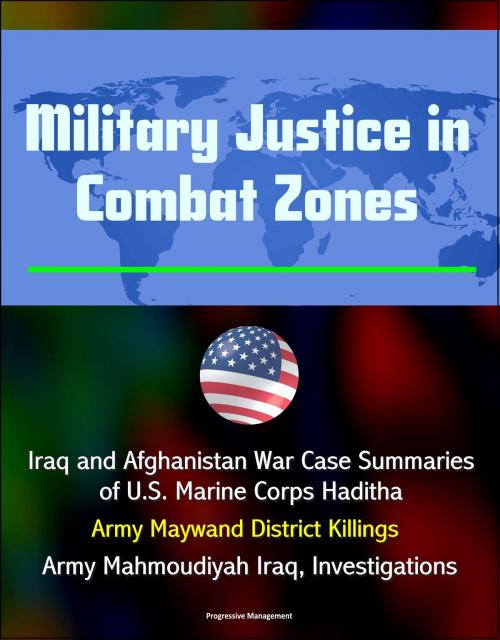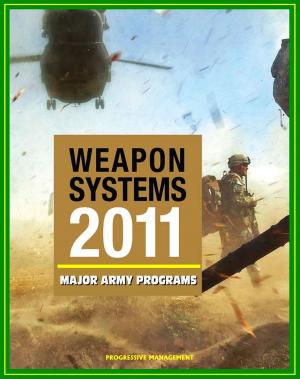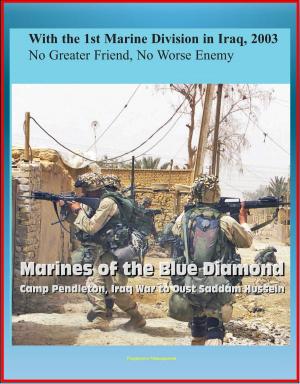Military Justice in Combat Zones: Iraq and Afghanistan War Case Summaries of U.S. Marine Corps Haditha; Army Maywand District Killings, Army Mahmoudiyah Iraq, Investigations
Nonfiction, Reference & Language, Law, Military, History| Author: | Progressive Management | ISBN: | 9781311982209 |
| Publisher: | Progressive Management | Publication: | November 7, 2014 |
| Imprint: | Smashwords Edition | Language: | English |
| Author: | Progressive Management |
| ISBN: | 9781311982209 |
| Publisher: | Progressive Management |
| Publication: | November 7, 2014 |
| Imprint: | Smashwords Edition |
| Language: | English |
This is the final report of the subcommittee of the Defense Legal Policy Board established to review and assess the application of military justice to Service members alleged to have committed offenses against civilians in combat zones.
The report provides important recommendations for the Department on civilian casualty prevention and response that will improve training, reporting and investigation in this area. Recommended improvements to military justice practice will spur the continued development and improvement of military justice in forward deployed areas and help ensure the system remains efficient, fair, dependable and credible.
The Subcommittee reviewed case studies of the following cases: U.S. Marine Corps Haditha cases; the U.S. Army, Maywand District Killings, Stryker cases; and the U.S. Army, Mahmoudiyah, Iraq/Green cases.
The stress of combat affects the ability of individuals, units and institutions to accomplish their missions, and respond to incidents and events. The counterinsurgency (COIN) missions that have characterized the conflicts in Iraq and Afghanistan compound the stress of combat. These missions require our Service members to operate alongside, and frequently interact with, the civilian community as well as host nation forces. Service members are often tasked with conducting difficult and complex missions that differ greatly from the kinetic combat operations for which they have historically been trained. When incidents involving the death, injury or abuse of civilians occur in combat, they have the potential to become great flash points, possibly undermining the mission and endangering the force.
Executive Summary * Introduction * Subcommittee Membership and the Secretary of Defense's Questions * Overview of Subcommittee Study * Role of the Joint Commander * Training * Reporting * Investigations * Case Resolution Process * Conclusion * Preface * Military Justice in Combat Zones * The Impact of Civilian Casualties on Mission Accomplishment Is Ever-Increasing * The Promotion of Good Order and Discipline in the Armed Forces in Combat * The Commander's Responsibilities for Reporting and Investigating Crimes * The Military Justice System in an Increasingly Joint Environment * Considerations When Conducting Judicial Operations in a Deployed Environment * Subcommittee Findings and Recommendations * Summary Findings and Recommendations * Issues Outside the Scope of the Secretary of Defense's Mandate * Sustained Best Practices * Incident Reporting * Civilian Casualty Reporting in Iraq and Afghanistan * What Should be Reported * Obstacles to Reporting * Enablers to Thorough, Prompt, and Accurate Reporting * Inquiry, Assessment, and Immediate Response * Preliminary Inquiry * Additional Assessment When Appropriate, in Coordination with Local Authorities * Appropriate, Rapid Responses to Incidents * Criminal Investigations * Administrative Investigations * Interface Between Investigators and Prosecution * Record Maintenance and Accessibility * Increase in Powers to Obtain Evidence * Speed and Oversight of Investigations * Case Resolution Processes * Role of the Convening Authority * Trying Cases Forward * Transfer of Convening Authority Functions * Increasing the Ability to Try Multiple Accused Together * Allowing for Alternatives to Live Testimony at Trial * Non-Judicial Punishment * Enabling the Commander in the Joint Operational Environment * Establish Joint Force Commander Control of Military Justice Processes * Provide Resources to the Joint Force Commander * Pretrial Confinement * The Article 32 Investigation Process * Control Over Contractors in the Operational Environment * Dereliction of Duty Pertaining to Civilian Casualties * Transparency Concerning the Disposition of Allegations * Mandatory Life Sentence for Premeditated Murder * Defense Access to Witnesses * Appeal to the Supreme Court
This is the final report of the subcommittee of the Defense Legal Policy Board established to review and assess the application of military justice to Service members alleged to have committed offenses against civilians in combat zones.
The report provides important recommendations for the Department on civilian casualty prevention and response that will improve training, reporting and investigation in this area. Recommended improvements to military justice practice will spur the continued development and improvement of military justice in forward deployed areas and help ensure the system remains efficient, fair, dependable and credible.
The Subcommittee reviewed case studies of the following cases: U.S. Marine Corps Haditha cases; the U.S. Army, Maywand District Killings, Stryker cases; and the U.S. Army, Mahmoudiyah, Iraq/Green cases.
The stress of combat affects the ability of individuals, units and institutions to accomplish their missions, and respond to incidents and events. The counterinsurgency (COIN) missions that have characterized the conflicts in Iraq and Afghanistan compound the stress of combat. These missions require our Service members to operate alongside, and frequently interact with, the civilian community as well as host nation forces. Service members are often tasked with conducting difficult and complex missions that differ greatly from the kinetic combat operations for which they have historically been trained. When incidents involving the death, injury or abuse of civilians occur in combat, they have the potential to become great flash points, possibly undermining the mission and endangering the force.
Executive Summary * Introduction * Subcommittee Membership and the Secretary of Defense's Questions * Overview of Subcommittee Study * Role of the Joint Commander * Training * Reporting * Investigations * Case Resolution Process * Conclusion * Preface * Military Justice in Combat Zones * The Impact of Civilian Casualties on Mission Accomplishment Is Ever-Increasing * The Promotion of Good Order and Discipline in the Armed Forces in Combat * The Commander's Responsibilities for Reporting and Investigating Crimes * The Military Justice System in an Increasingly Joint Environment * Considerations When Conducting Judicial Operations in a Deployed Environment * Subcommittee Findings and Recommendations * Summary Findings and Recommendations * Issues Outside the Scope of the Secretary of Defense's Mandate * Sustained Best Practices * Incident Reporting * Civilian Casualty Reporting in Iraq and Afghanistan * What Should be Reported * Obstacles to Reporting * Enablers to Thorough, Prompt, and Accurate Reporting * Inquiry, Assessment, and Immediate Response * Preliminary Inquiry * Additional Assessment When Appropriate, in Coordination with Local Authorities * Appropriate, Rapid Responses to Incidents * Criminal Investigations * Administrative Investigations * Interface Between Investigators and Prosecution * Record Maintenance and Accessibility * Increase in Powers to Obtain Evidence * Speed and Oversight of Investigations * Case Resolution Processes * Role of the Convening Authority * Trying Cases Forward * Transfer of Convening Authority Functions * Increasing the Ability to Try Multiple Accused Together * Allowing for Alternatives to Live Testimony at Trial * Non-Judicial Punishment * Enabling the Commander in the Joint Operational Environment * Establish Joint Force Commander Control of Military Justice Processes * Provide Resources to the Joint Force Commander * Pretrial Confinement * The Article 32 Investigation Process * Control Over Contractors in the Operational Environment * Dereliction of Duty Pertaining to Civilian Casualties * Transparency Concerning the Disposition of Allegations * Mandatory Life Sentence for Premeditated Murder * Defense Access to Witnesses * Appeal to the Supreme Court















